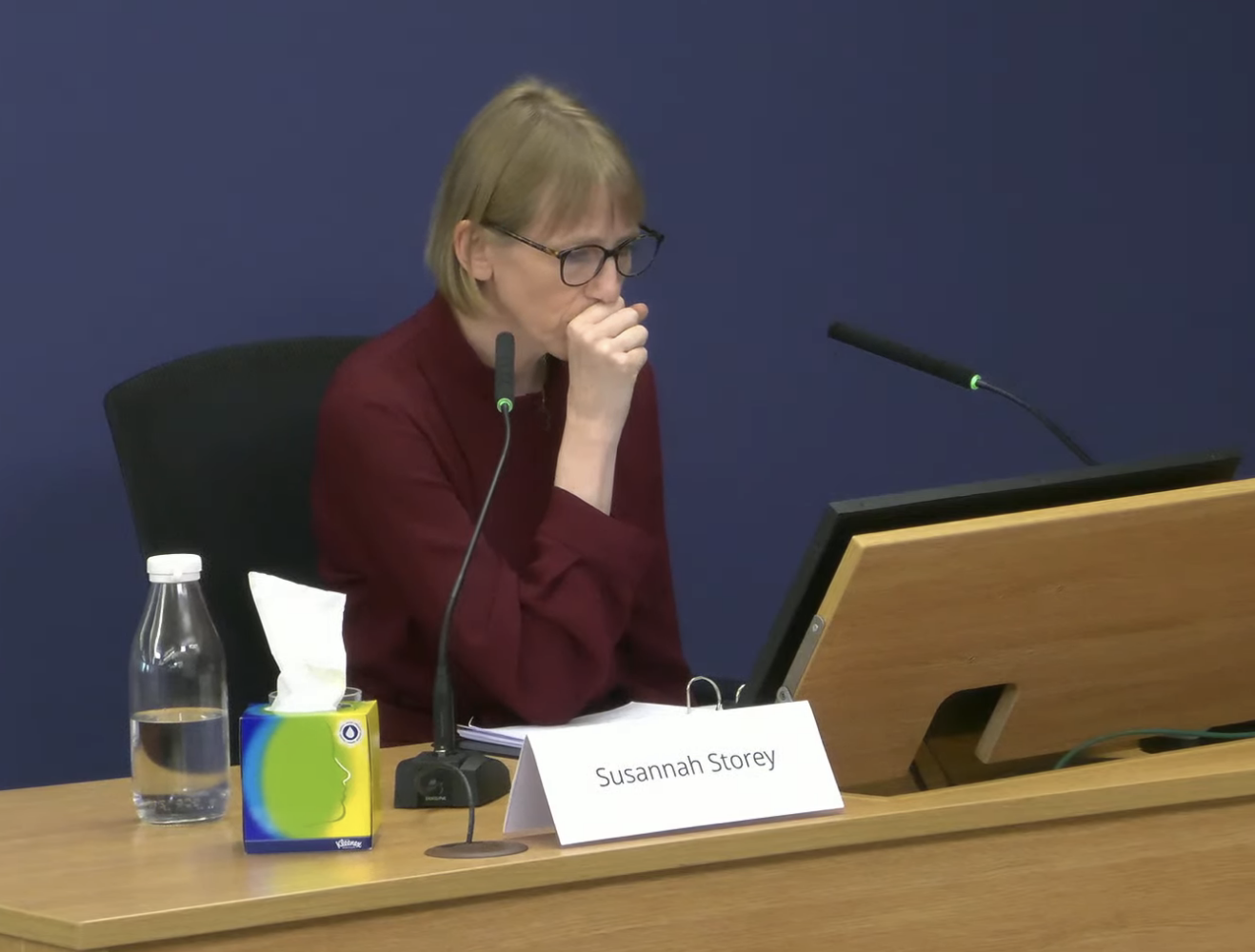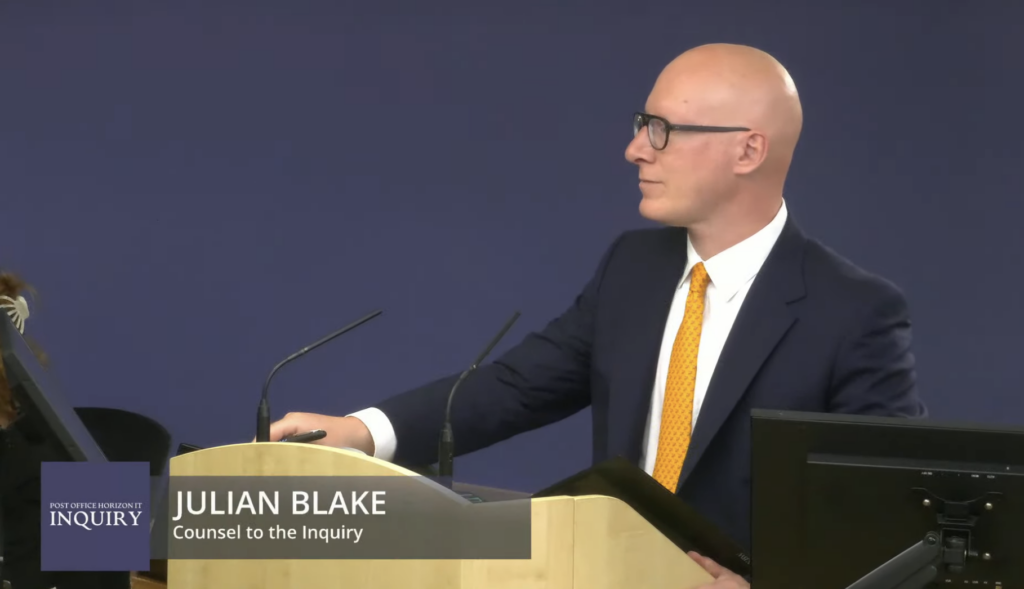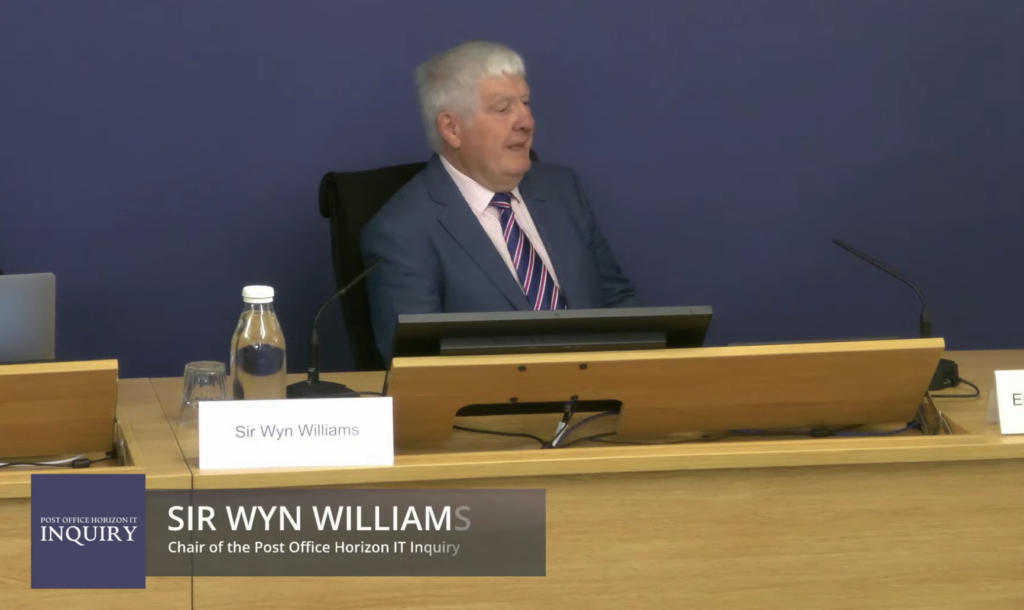
Usually when thinking about how to write a summary of the day’s evidence, there are one or two moments or lines which have made an impression. I’m struggling to think of anything Susannah Storey said during today’s session worth reporting.
I realise I’m not exactly selling what you’re about to read, but it did feel like a fitting anticlimax to fifteen long weeks of evidence.
Storey is a high-flying civil servant – currently Permanent Secretary at DCMS. She was the first shareholder NED (non-executive director) on the Post Office board, serving from March 2012 to April 2014. At the Inquiry today Storey came across as confident, serious and posh with a knack of sounding like she is giving a convincing answer whilst actually saying nothing of substance at all.
In 2011 Storey was made Director of the Business Department’s Royal Mail and Postal Services team within the Shareholder Executive (ShEx). As she told the Inquiry:
“once the government decided it wanted to have a shareholder representative on the board of the Post Office… it was the working assumption I think that as the [RMG and Postal Services] Director, that would be me.”
It was. Storey was not interviewed for the NED job – her first appointment to a company board – nor was she given any training when she got it, nor was she paid for doing the job beyond her civil service salary. To further complicate matters, on joining the Post Office board, Storey left the shareholder team at the Business Department – who took away her computer, email address and access. She spent the first year as a Post Office NED on maternity leave. Storey still attended board meetings, but seems to have spent most of the early part of her tenure being treated with suspicion by the rest of the board, who didn’t like having someone representing their owner spying on them. Storey told the Inquiry it was difficult:
“I was trying to do was kind of get my foot in the door, start this process, but also critically… build trust with that board of directors. So they were all… relatively new, at the non-executive level. I didn’t know any of them. I felt they didn’t trust me.”
Storey warned the inquiry it was likely to have seen a number of business emails sent to and from her personal address, but by lunchtime, after nearly three hours of evidence, we had yet to see a single missive sent by Storey to anyone – neither her fellow board members nor the Post Office execs she was meant to be scrutinising.

The only pro-active thing Storey appears to have done in her first year as a NED is confirm to that she would not share her board papers with her erstwhile colleagues at ShEx. Julian Blake, who was asking the questions for the Inquiry today, wondered whose decision this was. Storey replied:
“The documents unfortunately don’t really help me with exactly when this was discussed and how it was decided, but my sort of reflection now I guess is that given the nervousness of the chairman [Alice Perkins] about having a shareholder representative at all… I would have been mindful of that, and I think I was, and again I’m overlaying this now, I can’t recall exactly how it happened, but I think I would have been very keen to ensure that it was done [so] that we didn’t end up with a sort of two-tier board. My worry was that because they were so nervous about documents and interfaces with the shareholder, the worst of all worlds for this new April 2012 moment would have been if the board had sort of had two rooms, one where they discussed all the contentious things and then a very vanilla board that I was in, such that they felt the papers could be shared. So I think it must have been an agreement between Alice and I that I wouldn’t share and I guess I was also mindful of the fact in practical terms I wasn’t quite sure how I would share those hard copy papers at that time.”
The scandal itself seems to have passed Storey by entirely – she was regularly having conversations with the ShEx team about this that and the other, and whilst briefings about the Justice for Subpostmasters Alliance, Alan Bates and James Arbuthnot were pinged into her email inbox, Storey didn’t really register how important it all was, even whilst she sat on the Post Office’s Audit and Risk Committee.
At one point, Blake took Storey to board papers from October 2012, which for the first time split its litigation risk report into civil and criminal matters. The latter section gave the board a deeper level of detail about some of the Subpostmasters who had been prosecuted and the crimes they had allegedly committed. Storey told Blake it wasn’t discussed. Blake wondered if it was odd that the board, at the same meeting, could find time to discuss “the British Postal Museum and archive funding” and not Post Office’s activities whilst prosecuting Subpostmasters.
“Of course,” replied Storey “I think it would be impossible not to take that view now looking at this.”
By way of excusing herself for responsibility, Storey told Blake “the agendas, the rhythm of meetings would be set by the chairman and we as the non-executive directors would follow that.”

Sir Wyn Williams – the inquiry chair – wanted another look at the litigation report.
“I understand that this paper was for noting”, he said, “but for the first time, as I understand it, the board is being given information about completed and ongoing criminal cases, and just glancing at them, some of them are very significant. Someone has pleaded guilty to stealing over £100,000 on the page we’re looking at. Two brothers are accused of fraudulently obtaining or stealing over £200,000. Forgive me if I’m a little surprised that nobody thought to discuss these things, but that appears to be the case.”
“I agree with you and when you look at this page now, absolutely. I can’t recall the discussion…” started Storey, but the Chair interrupted her.
“I’m not for a minute suggesting you should remember the words spoken,” he said, “but the impression I get from you, so now’s your chance to correct it, that because this paper was to be noted, there was literally no discussion of it, and… I’m not hiding it, I’m expressing my surprise that a board for the first time confronted with this sort of detail doesn’t discuss it at all.”
“I agree with you and I don’t recall a discussion”, replied Storey, “I also don’t recall anybody highlighting it to us either, but I totally take your point.”
Storey was back from maternity leave by the time of the Second Sight Interim Report, but the only concern she seemed to express was the way the board was “blindsided” by its arrival and “bounced” into action. The action the board took has been well-documented (Mediation Scheme, Linklaters report, CK Sift Review and the appointment of Brian Altman QC). Storey doesn’t seem to have suggested, directed or influenced any of it.
End of Storey
After lunch we saw what I think was the only email from Storey presented during the entire hearing. She was part of a chain discussing the three options presented to the Audit and Risk Committee concerning a decision the board was being asked to take about the continuing prosecution of Subpostmasters.
The options can be summarised thus:
a) keep prosecuting
b) prosecute in certain circumstances only
c) let CPS decide
Storey preferred option c), telling Blake that since she learned about the Post Office’s prosecution function, she “felt instinctively uncomfortable” about it.
In her email Storey wrote: “given I’m not on the audit and risk committee I’m just passing my thoughts for information. But my read of the paper was similar to Alice [Perkins]. It doesn’t seem we had sufficient reasons to discard option c) and I think it would be interesting to explore further.”
Option b) won the day at the next board meeting.
“Do you recall speaking up in favour of your preferred option, option c)?” asked Blake.
“I’d already expressed my views in the email chain… I can’t remember if I said anything in particular” replied Storey.
By the autumn of 2013, Storey had a new job at the Department for Energy and Climate Change (DECC), which soon became demanding, to the extent that she resigned from the Audit and Risk Committee, didn’t turn up to one board meeting and had to leave another early to attend to her DECC duties. It was for this reason Storey sought to stand down from the Post Office board a year early, which she did in 2014, flitting off into the ether after apparently having made no impact on the business whatsoever.
NB: I did wonder if I was perhaps being unfair to Storey, by basing my judgment about her work solely on her oral evidence today, so I took the opportunity to have a (quick) read of her Witness Statement. I know she was treated with suspicion by the Post Office, cut off from the Business Department/ShEx, had to deal with being a new mum and then took a big job at DECC, but Storey really does not appear to have proactively achieved anything at the Post Office on her own initiative at all. Given she was a director during a key part of the scandal, that remains, as so many witnesses have said this year, a matter of regret.
Masochists wishing to read a blow-by-blow account of Storey’s evidence can click here – it does include some useful stats at the very end about the documents and witnesses the Inquiry has seen to date.
Oh alright, I’ll tell you here. We were informed that, to date, the inquiry has dealt with 267 oral witnesses, 496 witness statements and it has shared 250,000 documents with core participants, coming in at 2,000,000 pages. The Chair also told today’s hearing that the next phase of the Inquiry is 95% likely to begin week commencing 23 September and will go on into November. Phase 7 will be looking at compensation and the Post Office’s current practice, including the performance of senior people within the organisation and government.
I am not intending to cover Phase 7 in anything like the detail I have covered the Inquiry to date, but I’m sure I’ll drag myself along for at least one hearing every couple of weeks.
Have a good summer!
The journalism on this blog is crowdfunded. If you would like to join the “secret email” newsletter, please consider making a one-off donation. The money is used to keep the contents of this website free. You will receive irregular, but informative email updates about the Post Office Horizon IT scandal.

Leave a Reply